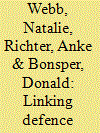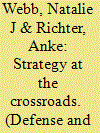| Srl | Item |
| 1 |
ID:
136074


|
|
|
|
|
| Summary/Abstract |
“Smart Defense” is NATO's new approach to risk- and burden-sharing, which has been a chronic problem within the alliance since the 1950s. Numerous solutions have been proposed, but initiatives resulting in more equitable burden-sharing have never been fully implemented. There are two driving forces influencing a county's willingness to support such initiatives – the economic theory of alliances and the risks posed by the implementation of capability sharing. The authors examine each of these and propose that rather than aiming for group consensus on the production of capabilities, NATO should focus on interoperability through support functions. This approach provides the most likely solution for connecting the forces, doctrine, procedures, standards and other factors of joint capability production such that country leaders find the risks of doing so to be politically and militarily acceptable.
|
|
|
|
|
|
|
|
|
|
|
|
|
|
|
|
| 2 |
ID:
136736


|
|
|
|
|
| Summary/Abstract |
“Smart Defense” is NATO's new approach to risk- and burden-sharing, which has been a chronic problem within the alliance since the 1950s. Numerous solutions have been proposed, but initiatives resulting in more equitable burden-sharing have never been fully implemented. There are two driving forces influencing a county's willingness to support such initiatives – the economic theory of alliances and the risks posed by the implementation of capability sharing. The authors examine each of these and propose that rather than aiming for group consensus on the production of capabilities, NATO should focus on interoperability through support functions. This approach provides the most likely solution for connecting the forces, doctrine, procedures, standards and other factors of joint capability production such that country leaders find the risks of doing so to be politically and militarily acceptable.
|
|
|
|
|
|
|
|
|
|
|
|
|
|
|
|
| 3 |
ID:
100139


|
|
|
| 4 |
ID:
097074


|
|
|